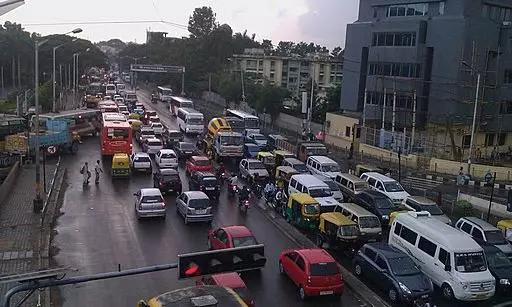
- Home
- India
- World
- Premium
- THE FEDERAL SPECIAL
- Analysis
- States
- Perspective
- Videos
- Sports
- Education
- Entertainment
- Elections
- Features
- Health
- Business
- Series
- In memoriam: Sheikh Mujibur Rahman
- Bishnoi's Men
- NEET TANGLE
- Economy Series
- Earth Day
- Kashmir’s Frozen Turbulence
- India@75
- The legend of Ramjanmabhoomi
- Liberalisation@30
- How to tame a dragon
- Celebrating biodiversity
- Farm Matters
- 50 days of solitude
- Bringing Migrants Home
- Budget 2020
- Jharkhand Votes
- The Federal Investigates
- The Federal Impact
- Vanishing Sand
- Gandhi @ 150
- Andhra Today
- Field report
- Operation Gulmarg
- Pandemic @1 Mn in India
- The Federal Year-End
- The Zero Year
- Science
- Brand studio
- Newsletter
- Elections 2024
- Events
- Home
- IndiaIndia
- World
- Analysis
- StatesStates
- PerspectivePerspective
- VideosVideos
- Sports
- Education
- Entertainment
- ElectionsElections
- Features
- Health
- BusinessBusiness
- Premium
- Loading...
Premium - Events

The tunnel project is causing concern, given the track-record of pathetic execution of even minor civil construction works in Bengaluru city until now
If Karnataka’s Siddaramaiah government has its way, Bengaluru is all set to undergo a major and risky “bypass surgery”.
The surgery, in the form of a tunnel road network 120 feet deep, will burrow through the heart of the city, at an exorbitant expense.
The project is causing concern, given the track-record of pathetic execution of even minor civil construction works in the city. Governments run by all the three major political parties in the state have thus far shown themselves to be incapable of even completing a short, straightforward flyover on time or needed court directives to fill even potholes on the city’s notoriously sclerotic roads.
It is in this context that the Congress dispensation is attempting the gargantuan project estimated at a whopping Rs 40,000 crore. The first phase is estimated at Rs 19,000 crore.
It may look promising on paper but has the potential to inflict a lasting and irredeemable blow to the future of this city, which was once known for its greenery, cleanliness and well laid out infrastructure.
Tunnel vision
The tunnel network, comprising two roads in the north-south and east-west directions, promoted forcefully by the state’s deputy Chief Minister D K Shivakumar, is in two phases.
The first in the north-south direction is around 18km in length and later another in the east-west direction is around 22 km. The north-south tunnel will link the meme-inspiring Silk Board junction, infamous for its traffic jams, on Hosur road to the Hebbal flyover, a key node on the way to the international airport.
Also read: Has the tussle in Karnataka for CM’s post really been resolved? Unlikely
The project seems prima facie unviable as urban mobility specialists have expressed doubts over its utility value given that it is meant largely for use by private vehicles, mainly cars, and will cost around Rs 330 in toll charges one way.
For the kind of disruption it will cause to the city when construction is on, to the unknown impact it will have on the sensitive underground geological structure – all for the benefit of a small percentage of car users, the proposed plan reflects a myopic “tunnel vision”, points out senior journalist and a specialist in urban mobility, Rasheed Kappan, in an article on Mongabay.
In the first phase, a 18km tunnel is proposed to be built in the north-south direction. It will link the meme-inspiring Silk Board junction, infamous for its traffic jams, on Hosur road to the Hebbal flyover, a key node on the way to the international airport.
Key disruptions
The tunnel road, which is to be 120 feet below the ground, could disrupt the water aquifer channels and other naturally occurring geological structures on which the city rests, write hydrogeologists G V Hegde and K C Subhash Chandra in the local daily Deccan Herald.
The founder of a citizens’ initiative Rajkumar Dugar, in a detailed examination of the tunnel road project in the Citizens’ Matter digital platform elaborates on more uncertainties in the course of the construction. Bengaluru which in the recent past experienced shortage of ground water due to a shortfall in rain, could end up becoming even more vulnerable as the planned tunnel runs close to at least two major freshwater lakes, going by his argument.
According to another report in the Deccan Herald, at least five iconic locations in Bangalore will be dug including within the world-renowned Lalbagh botanical park. The digging here is to be reportedly in close proximity to Lalbagh’s gneiss hillock, of solid rock that is at least 2.5 billion years old.
A second of five localities earmarked for digging is within the St John’s Hospital complex that the management reportedly fears will disturb the functioning of this hospital, one of the most prominent in the city.
Alternative ways
Proponents of the tunnel road may argue that the infrastructural surgery is required for the city’s growth to accommodate its exponential growth and to ease traffic congestion. But there are simpler ways of doing that.
Improving public transport to reduce usage of private vehicles, ensuring better road quality with all potholes covered and enforcing better traffic management can make a huge difference to the quality of travel within the city’s roads. These alternatives suggested by well-meaning commentators on urban planning like Kathyayini Chamaraj, the executive trustee of CIVIC-Bangalore, however don’t seem to have impressed the government.
Also read: Prestige Group to build 1.5 km flyover in Bengaluru
The core question is whether the city’s planners and government agencies are capable of efficiently executing the construction of the massive tunnel project. Until now, no infrastructure project has ever been completed on time. Delays are par for the course, and quality is suspect.
Here, one is referring to much smaller projects which are nowhere near comparison with the humongous size and scope of the proposed tunnel road.
Commuters' woes
Worse, during the course of any construction, commuters struggle to pass through given the lack of alternatives in most cases. During the making of the Metro rail phase one, for instance, the high-profile Mahatma Gandhi Road and Brigade Road had virtually turned into a ghost town.
Businesses were badly hit for several months. The kind of disruption that the tunnel project would entail is too scary to even contemplate.
Take the case of a nearly 3 km flyover across Koramangala, Bengaluru’s hi-tech locality which reportedly boasts of a high density of start-ups comparable to any other similar locality anywhere in the world. Called the Ejipura flyover, as it originates from this locality, this minor flyover project has been delayed by about eight years, and still far away from completion.
This flyover which is coming up over the arterial Koramangala main road is a nightmare during peak traffic, strewn with incomplete pillars, the air heavy with dust and sections of the road cordoned off for construction.
The Bengaluru metro construction is a tale of delays galore. Though this is a joint Centre-state project, what is relevant here is the display of the city’s poor work culture, especially relating to government funded projects.
Also read: Karnataka Cabinet approves Rs 3,400 cr projects, Bengaluru gets major share
To begin with, during the construction of Phase One, the so-called Purple line that was also meant to showcase the Metro, from the prominent MG Road in the central business district (CBD) to Byappanahalli via the popular Indiranagar area – a mere six km long – was delayed by around 18 months when it finally opened in 2011.
The opening of the Metro’s Green line linking the city’s north to the south was similarly delayed.
Failure with flyovers
It is not as if the decisions taken and works executed by the state government in Bengaluru have been done after proper planning. There are instances where existing flyovers have had to be demolished as they were discovered to be poorly planned.
In one instance, signal lights had to be installed on top of the Richmond flyover as the badly designed construction was causing traffic jams instead of facilitating a smooth ride.
This even inspired a popular Kannada film sardonically titled U-Turn. After some tinkering with the traffic flow, some sanity eventually returned to the flyover.
The Hebbal flyover, a key and complex intersection en route to the Bengaluru International airport, is so badly planned that each day is a headache for commuters and the traffic police. Since the time it was constructed in 2003 in anticipation of the new airport five years later, it has been tinkered with time and again to regulate the flow of traffic.
A ramp to one side of the flyover was recently demolished as part of a redesign. So, it continues to be a perpetual work in progress. More complications are in the offing for this crucial intersection, as it is being turned multi-nodal.
Killer underpasses
Underpasses are no better. The drainage systems in them are non-functional, so much so, even during normal rains, they invariably get flooded. In a not-so-unexpected tragedy given the poor design, a car completely submerged inside one such underpass at K R Circle, a stone’s throw away from Vidhana Soudha, the state legislature.
A 23-year-old woman techie, trapped inside the car, drowned.
Also read: 'Bengaluru traffic is insane': Sabeer Bhatia's post triggers online debate
Government officials typically use the excuse of a growing city to hide behind what is essentially poor planning and inefficient implementation in each and every infrastructure project. Incidentally, these core characteristics don’t have anything to do with which party is in power.
The Congress, BJP and the Janata Dal have shown they are not different from one another, especially on this issue.
Menace of corruption
And, the biggest elephant in the room – widespread corruption. When the BJP was in power the Karnataka State Contractors’ Association accused the party of demanding a 40 per cent bribe. The Nagamohan Das inquiry commission has submitted its findings to the government. Now, the contractors are levelling similar allegations against the ruling Congress.
With such a questionable reputation of planning, building and managing key infrastructure, allegations of corruption and the lack of accountability, is it any surprise that the government-sponsored tunnel road plan is sending shivers up the spine of the city’s residents?


